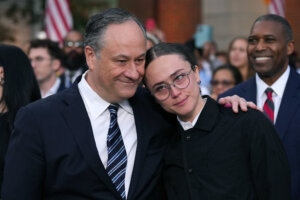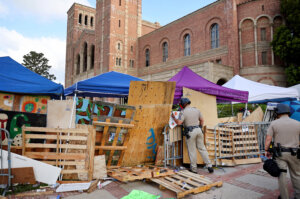Photo by Getty Images
It may not come as a surprise that in an election year, six of the Forward’s 10 most-read articles were about American politics.
Perhaps less expected is that the main characters in many of the top stories were not Jewish.
Instead, 2024 was a year when Forward readers tried to understand how new leadership in both major American political parties would respond to upheaval in the Middle East and to rising domestic concerns about antisemitism.
We’ll be back in 2025 with more coverage on that front. Until then, here are the 10 most-read articles of 2024.
AOC’s comments acknowledging that some criticism of Israel crossed the line into antisemitism during a June panel infuriated supporters in the Democratic Socialists of America. The party’s decision to punish Ocasio-Cortez in spite of her progressive bona fides — including her references to to the Oct. 7 war as a genocide, her sponsorship of a bill advocating for a ceasefire, and her and vote to limit arms sales to Israel — reflected the movement’s increased hostility toward any position that isn’t explicitly anti-Zionist. Among DSA’s criticisms were Ocasio-Cortez’s pro vote on measures affirming Israel’s right to exist and condemning Hamas.
A chaotic scene unfolded in the synagogue at Chabad’s international headquarters in Brooklyn after yeshiva students who secretly tunneled under the building — purportedly to expand the synagogue — tried to stop contractors from plugging the hole they had dug. Police arriving at 770 Eastern Parkway found dozens of students barricading themselves in a hollowed-out space under the synagogue’s women’s section. Viral video from the synagogue, along with other clips that appeared to show Lubavitchers using a sidewalk grate to access the tunnel, made the story an international sensation.

Vice President Kamala Harris’ rapid ascent this summer to Democratic presidential nominee brought a renewed focus on Second Gentleman Doug Emhoff and his 25-year-old daughter. Ella Emhoff, who does not identify as Jewish, and had raised money for UNRWA and the Palestinian Children’s Relief Fund, facts that some believed would be used in right-wing attacks on Harris.
Harris’ selection of folksy Minnesota Gov. Tim Walz as her running mate came at the expense of a Jewish contender for the role, Pennsylvania Gov. Josh Shapiro, whose politics on Israel and antisemitism were well-known. But while progressives disillusioned with the Biden administration over the war in Gaza indicated they would be happier if Walz was picked, Harris failed to make significant headway with those voters, and ultimately lost all seven swing states.

The image of Hamas militants taking the corpse of Shani Louk into Gaza on Oct. 7 led a series of photographs submitted by the Associated Press that won a contest sponsored by the Missouri School of Journalism. The award sparked outrage among some who saw the photo as disrespectful to Louk, a German-Israeli tattoo artist who was 22 when she was murdered at the Nova Music Festival. But Louk’s father defended the prize, as did news organizations that argued such photographs are crucial to documenting atrocities.
Harris’ stance on Israel’s war in Gaza was a defining campaign issue, drawing attacks from both from the progressive left and conservatives. A text-message blast to Pennsylvania voters in the runup to the election apparently tried to exploit the vulnerability, purporting to come from an Israel supporter named Avi and saying that Harris was “running conflicting ads” only for political purposes. The Verge reported that the messages were sent by a company that works with a Republican consultant.
Trump routinely disparaged Jewish Democrats leading up to the election, calling them disloyal, saying they hate their religion, or that they don’t love Israel enough. But even by his own standards, the Republican nominee’s comments Sept. 19 were enough to grab headlines. At an event called “Fighting Antisemitism in America,” Trump told a crowd largely consisting of Jews that “the Jewish people would have a lot to do with a loss.” The comment — which seemed to pre-assign blame to Jews in case of a negative election outcome for Trump — struck many as offensive.

With news helicopters circling overhead, a group of pro-Israel agitators attacked a pro-Palestinian tent encampment at UCLA on April 30. For more than two hours, they threw fireworks, sticks and other objects into the encampment, tried to dismantle its particle-board walls and tussled with protesters trying to keep them out. Writing in the Forward, UCLA professor David Myers called the incident “a total systems failure by the university.”
The viral scenes from 770 Eastern Parkway surfaced a long-simmering dispute between Chabad factions over control of the synagogue on its bottom floor — and a long-delayed dream to expand it. The Forward published renderings of the synagogue expansion, and exclusive interviews with one of the tunnel’s architects.
The nomination of Vance, whose rise to the Senate began with a bestselling memoir set in the Rust Belt, raised questions over whether Israel was an exception to the Ohio junior senator’s isolationist politics — or the prime example.

I hope you appreciated this article. Before you go, I’d like to ask you to please support the Forward’s award-winning, nonprofit journalism during this critical time.
We’ve set a goal to raise $260,000 by December 31. That’s an ambitious goal, but one that will give us the resources we need to invest in the high quality news, opinion, analysis and cultural coverage that isn’t available anywhere else.
If you feel inspired to make an impact, now is the time to give something back. Join us as a member at your most generous level.
— Rachel Fishman Feddersen, Publisher and CEO

